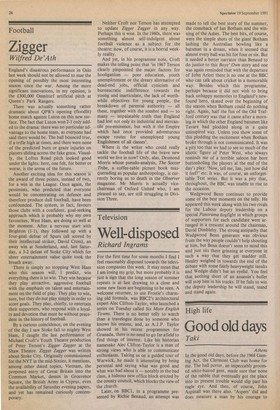Football
Zigger
Wilfred De'Ath
England's disastrous performance in Oslo last week should not be allowed to mar the opening of possibly the most interesting season since the war. Among the more significant innovations, in my opinion, is the £300,000 Omniturf artificial pitch at Queen's Park Rangers.
There was actually something rather dramatic about QPR's opening (floodlit) home match against Luton on this new surface. The fact that Luton won 2-1 only added to the drama: there was no particular advantage to the home team, as everyone had said there would be. The ball bounced true, if a trifle high at times, and there were none of the predicted burn or graze injuries on players sliding across the fake grass. Visually, the Loftus Road pitch looked good under the lights: here, one felt, for better or worse, is the arena of the future.
Another exciting idea for this season is the award of three points, instead of two, for a win in the League. Once again, the pessimists, who predicted that everyone would be concentrating on defence and therefore produce dull football, have been confounded. The system, in fact, favours those clubs with a confident, goal-seeking approach which is probably why my own favourites, West Ham, are doing so well at the moment. After a nervous start with Brighton (1-1), they followed up with a four-goal defeat of Spurs (all scored by their intellectual striker, David Cross), an away win at Sunderland, and, last Saturday, a 3-2 defeat of Stoke City which for sheer entertainment value quite took the breath away.
There is simply no stopping West Ham who this season will, I predict, win everything there is to win. They win because they play attractive, aggressive football with the emphasis on talent and entertainment on the field of play. They play to win, sure, but they do not play simply in order to score goals. They play, chiefly, to entertain their supporters, who respond with a loyalty and devotion that must be without precedent in the history of football.
By a curious coincidence, on the evening of the day I saw Stoke fall to mighty West Ham, I caught the last performance of Michael Croft's Youth Theatre production of Peter Terson's Zigger Zagger at the Shaw Theatre. Zigger Zagger was written about Stoke City. Originally commissioned for the NYT in the mid-Sixties, it mentions, among other dated topics, Vietnam, the proposed entry of Great Britain into the Common Market, demos in Grosvenor Square, the British Army in Cyprus, even the availability of Saturday evening papers, and yet has remained curiously contemporary. Neither Croft nor Terson has attempted to update Zigger Zagger in any way. Perhaps this is wise. In the 1960s, there was something almost self-indulgent about football violence as a subject for the theatre: now, of course, it is a horrid weekly reality.
And yet, in his programme note, Croft makes the telling point that 'in 1967 Terson clearly pinpointed the major factors for hooliganism — poor education, youth unemployment or the dreary alternative of dead-end jobs, official cynicism and bureaucratic indifference towards the young and inarticulate, the lack of worthwhile objectives for young people, the breakdown of parental authority — all these, together with the sombre and — to many — unpalatable truth that England had lost not only its industrial and mercantile pre-eminence, but with it the Empire which had once provided adventurous escape routes for unemployed young Englishmen of all classes'.
Where is the writer who could really tackle the football life of the brave new world we live in now? Only, alas, Desmond Morris whose pseudo-analysis, The Soccer Tribe, a coffee-table picture book masquerading as popular anthropology, is currently boring us to death in the Observer magazine. Mr Morris is actually vicechairman of Oxford United who, I am pleased to say, are still struggling in Division Three.


































 Previous page
Previous page